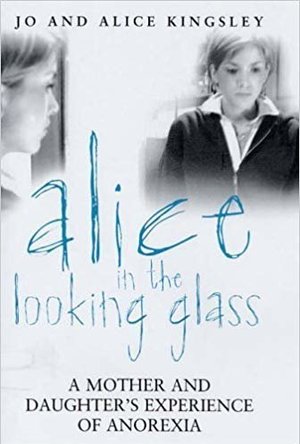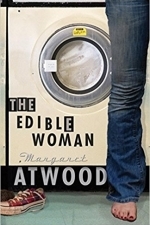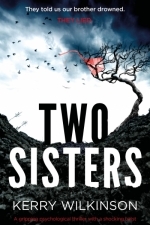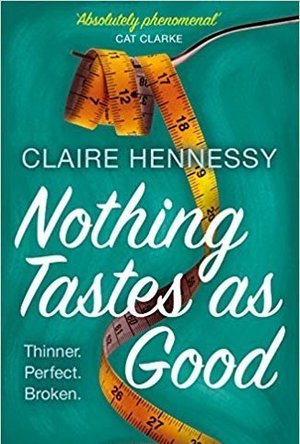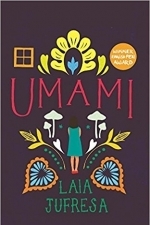Search
Eleanor Luhar (47 KP) rated Alice in the Looking Glass: A Mother and Daughter's Experience of Anorexia in Books
Jun 24, 2019
I'm probably more obsessed with ED books than is healthy, but it's so reassuring to read other people's experiences that are similar to my own. This book was absolutely fantastic - not only did it help me see that I'm not alone or abnormal, but I was also able to read a mother's point of view on the experience. I understand now how awful it must have been for my own mother during my inpatient hospital stay and the initial battle of getting a diagnosis.
I found it interesting that they gave Jo (the mother)'s perspective first, instead of Alice herself. We learn about what she witnesses before we find out exactly what Alice was actually thinking and feeling.
They don't include weights or numbers in this, which is tremendously helpful. Like Jo says, this is a competitive illness, and even parents seem to want to compete in having the "most poorly" child. But it's so triggering for other people to read about how much weight someone lost, and it's not really relevant. Weight loss is just a side affect of the illness, and not the main issue itself.
The reality is addressed so honestly in this book, all the feelings and experiences that we may be ashamed to admit are written in black and white. It made me feel a lot less guilty about things that I've felt, knowing other people have felt the same way, too. And the recovery aspect was not unrealistically easy or happy; Alice is not completely recovered even at the end of the book, but is managing her illness. That is how most of us will live for a long time, if not for the rest of our lives. But Alice expresses how she is so much happier "managing" her anorexia than she was when she was suffering years ago. It gives hope - even if you don't fully recover, life can be good.
I really loved this book. I'd urge anyone with a loved one who is suffering from an eating disorder (or has one themselves) to read this, as it would really help seeing both perspectives on the journey. 5 stars.
I found it interesting that they gave Jo (the mother)'s perspective first, instead of Alice herself. We learn about what she witnesses before we find out exactly what Alice was actually thinking and feeling.
They don't include weights or numbers in this, which is tremendously helpful. Like Jo says, this is a competitive illness, and even parents seem to want to compete in having the "most poorly" child. But it's so triggering for other people to read about how much weight someone lost, and it's not really relevant. Weight loss is just a side affect of the illness, and not the main issue itself.
The reality is addressed so honestly in this book, all the feelings and experiences that we may be ashamed to admit are written in black and white. It made me feel a lot less guilty about things that I've felt, knowing other people have felt the same way, too. And the recovery aspect was not unrealistically easy or happy; Alice is not completely recovered even at the end of the book, but is managing her illness. That is how most of us will live for a long time, if not for the rest of our lives. But Alice expresses how she is so much happier "managing" her anorexia than she was when she was suffering years ago. It gives hope - even if you don't fully recover, life can be good.
I really loved this book. I'd urge anyone with a loved one who is suffering from an eating disorder (or has one themselves) to read this, as it would really help seeing both perspectives on the journey. 5 stars.
Jamie (131 KP) rated The Edible Woman in Books
May 24, 2017
An honest exploration of the roles of women, marriage, and entering adulthood
Marian is an average college-educated woman who lives with a roommate in a decent apartment, works for a survey company, is moderately good looking, and has a handsome fiancé who is on his way to being a big shot lawyer. It sounds like life altogether is going pretty well for Marian. Yet for some reason she feels empty, why?
The Edible Woman explores the themes of losing a sense of self with maturity. At work she is pushed around, her roommate Ainsley is inconsiderate, the landlady is judgmental, and her boyfriend Peter is self centered and makes snide comments at Marian’s expense, acting like he can barely tolerate her. With each encounter Marian puts aside her pride for the sake of avoiding conflict. Marian expresses her problems through eating, or the lack thereof, hinting at a potential eating disorder. Just as she feels inhibited in life, she suddenly feels inhibited with the kinds of food that she can eat.
As the story continues she begins to dread marriage and question the direction her life is going—becoming just as listless as her friend and former classmate Clara, who after marriage and three pregnancies just seems beaten down. Marian’s fiancé Peter is the stereotypical perfect bachelor: a man’s man that looks down on women and views marriage as a ball and chain. Peter pushes Marian around in order to mold her into a subservient woman. There is no longer any room for her thoughts, her feelings, or her desires from under his shadow.
But what about work? What are women’s roles in society and the work force? Throughout the story there are several women including Marian with college educations, yet none of them really have a stable career. Women are expected to be wives and mothers, there’s simply no time for an education or a job. In this case, their educations are ultimately viewed as their downfall due to the crushing reality of how little opportunity they would have. This was the very sad truth at the time the book was written and thankfully is not exactly the case now in most parts of the world.
Atwood tackles a large number of social issues throughout the book that I think would be important for any young woman. Adulthood, relationships, marriage, the choice between work and education versus starting a family, and lastly feminism—both good and bad. (Hint: Ainsely is a perfect example of a bad feminist.)
There are certain elements of the book that are becoming quite dated. Namely the typewriters, the social expectation that all women can be are housewives, and the limited ways that women can dress; These things might make it difficult for young women to look past and relate to the main character. Despite this the book is still incredibly relevant in the message that it brings about maintaining one’s individuality. I absolutely love this book and found a lot of my former self in it’s pages.
The Edible Woman explores the themes of losing a sense of self with maturity. At work she is pushed around, her roommate Ainsley is inconsiderate, the landlady is judgmental, and her boyfriend Peter is self centered and makes snide comments at Marian’s expense, acting like he can barely tolerate her. With each encounter Marian puts aside her pride for the sake of avoiding conflict. Marian expresses her problems through eating, or the lack thereof, hinting at a potential eating disorder. Just as she feels inhibited in life, she suddenly feels inhibited with the kinds of food that she can eat.
As the story continues she begins to dread marriage and question the direction her life is going—becoming just as listless as her friend and former classmate Clara, who after marriage and three pregnancies just seems beaten down. Marian’s fiancé Peter is the stereotypical perfect bachelor: a man’s man that looks down on women and views marriage as a ball and chain. Peter pushes Marian around in order to mold her into a subservient woman. There is no longer any room for her thoughts, her feelings, or her desires from under his shadow.
But what about work? What are women’s roles in society and the work force? Throughout the story there are several women including Marian with college educations, yet none of them really have a stable career. Women are expected to be wives and mothers, there’s simply no time for an education or a job. In this case, their educations are ultimately viewed as their downfall due to the crushing reality of how little opportunity they would have. This was the very sad truth at the time the book was written and thankfully is not exactly the case now in most parts of the world.
Atwood tackles a large number of social issues throughout the book that I think would be important for any young woman. Adulthood, relationships, marriage, the choice between work and education versus starting a family, and lastly feminism—both good and bad. (Hint: Ainsely is a perfect example of a bad feminist.)
There are certain elements of the book that are becoming quite dated. Namely the typewriters, the social expectation that all women can be are housewives, and the limited ways that women can dress; These things might make it difficult for young women to look past and relate to the main character. Despite this the book is still incredibly relevant in the message that it brings about maintaining one’s individuality. I absolutely love this book and found a lot of my former self in it’s pages.
Beckie Shelton (40 KP) rated Two Sisters in Books
May 28, 2017
Such a great Read
Two Sisters By Kerry Wilkinson is well worth a read.
I would describe this as a psychological mystery but with the added bonus of it dipping its toe into the waters of mental illness and addiction to.
To summarise we have two sisters Megan and Chloe who after the death of their parents in a road accident, journey back to their parents holiday cottage in Whitecliff to stay, supposedly to sort out their affairs and get the cottage in order.
But for Megan, there are different reasons for her return she has received a postcard with the letter Z spelt on it.
years ago the girls older brother Zak went missing at Whitecliff his body never found, Megan the oldest sister is determined to figure out the truth of what has happened to her brother and she will bulldoze down whoever gets in her way.
Now the sisters are an interesting pair, having spent their time at different boarding schools growing up, these two are like chalk and cheese.
We have Chloe the younger of the two nearly seventeen a bit shy, but friendly and open, Chloe doesn't like to rock the waters and I get the impression she's a bit of a people pleaser. She's also a fabulous artist, A vegan and looks like her mother.
Now Megan, by contrast, is the exact polar opposite of her younger sister, she's prickly, bad tempered, goes out of her way to cause strife and shock in people.
there's a lot of deep-seated issues that are girl needs to get a handle on she is addicted to prescription drugs which she acquires through dubious means and as if that's not enough she is also suffering from an eating disorder, which her sister pretends to turn a blind eye too.
So as you can see there is an awful lot going on here.
As the story progresses truths that people want buried come to light, Megan puts herself and sister in extreme danger and some people are so not what they seem in Whitecliff.
Two sisters was definitely a page turner with a flowing easy storyline that sucked you in from the start. I especially appreciated Megan's issues, this added a whole extra layer to the storyline enriching it greatly. Eating disorders are a subject close to my heart, so it was fascinating to kind of get into the mindset of an individual suffering from this type of mental illness. The addiction storyline was also an extremely fascinating issue, we often see drug taking in novels but prescription drug addiction, even know so prevalent, is not explored so frequently in fiction.
But I have to say my favourite aspect of Two Sisters was seeing the two girls connect together after being virtual strangers growing up, now that was really charming indeed.
So, in conclusion, I found this a Fabulous book and I would definitely recommend this to other readers.
Thank you to the publisher and NetGalley for providing me with a free advance reader copy of Two Sisters by Kerry Wilkinson. This is my own unbiased opinion of this novel.
Arc Reviewed By BeckieBookworm
https://www.beckiebookworm.com/
https://www.facebook.com/beckiebookworm/
https://www.goodreads.com/user/show/9460945-bex-beckie-bookworm
I would describe this as a psychological mystery but with the added bonus of it dipping its toe into the waters of mental illness and addiction to.
To summarise we have two sisters Megan and Chloe who after the death of their parents in a road accident, journey back to their parents holiday cottage in Whitecliff to stay, supposedly to sort out their affairs and get the cottage in order.
But for Megan, there are different reasons for her return she has received a postcard with the letter Z spelt on it.
years ago the girls older brother Zak went missing at Whitecliff his body never found, Megan the oldest sister is determined to figure out the truth of what has happened to her brother and she will bulldoze down whoever gets in her way.
Now the sisters are an interesting pair, having spent their time at different boarding schools growing up, these two are like chalk and cheese.
We have Chloe the younger of the two nearly seventeen a bit shy, but friendly and open, Chloe doesn't like to rock the waters and I get the impression she's a bit of a people pleaser. She's also a fabulous artist, A vegan and looks like her mother.
Now Megan, by contrast, is the exact polar opposite of her younger sister, she's prickly, bad tempered, goes out of her way to cause strife and shock in people.
there's a lot of deep-seated issues that are girl needs to get a handle on she is addicted to prescription drugs which she acquires through dubious means and as if that's not enough she is also suffering from an eating disorder, which her sister pretends to turn a blind eye too.
So as you can see there is an awful lot going on here.
As the story progresses truths that people want buried come to light, Megan puts herself and sister in extreme danger and some people are so not what they seem in Whitecliff.
Two sisters was definitely a page turner with a flowing easy storyline that sucked you in from the start. I especially appreciated Megan's issues, this added a whole extra layer to the storyline enriching it greatly. Eating disorders are a subject close to my heart, so it was fascinating to kind of get into the mindset of an individual suffering from this type of mental illness. The addiction storyline was also an extremely fascinating issue, we often see drug taking in novels but prescription drug addiction, even know so prevalent, is not explored so frequently in fiction.
But I have to say my favourite aspect of Two Sisters was seeing the two girls connect together after being virtual strangers growing up, now that was really charming indeed.
So, in conclusion, I found this a Fabulous book and I would definitely recommend this to other readers.
Thank you to the publisher and NetGalley for providing me with a free advance reader copy of Two Sisters by Kerry Wilkinson. This is my own unbiased opinion of this novel.
Arc Reviewed By BeckieBookworm
https://www.beckiebookworm.com/
https://www.facebook.com/beckiebookworm/
https://www.goodreads.com/user/show/9460945-bex-beckie-bookworm
Eleanor Luhar (47 KP) rated Nothing Tastes as Good in Books
Jun 24, 2019
I happened to see this book by chance, in my local library. I was drawn to it because it's cover, it's title - I'm anorexic, and I happen to be drawn to things relating to mental health. It doesn't expressly say on it that it's about anorexia, but the cover made it pretty obvious to me. A warning to anyone that wants to read it: it's hard. If you suffer from something like this, like me, then you will probably have difficulty reading something so close to home. Especially if you're recovering. But it gets better. (I mean the book; I'm not using that "life gets better" crap.)
So Annabel is dead. I'm studying The Lovely Bones at school so the whole beyond-death narration isn't that special to me now. But Hennessy does it pretty differently to Sebold.
We don't know much about Annabel, not at first. But we begin to learn about her while she helps her assigned "soul-in-need" - The Boss (definitely not God) has promised her a final communication with her family if she helps Julia. And this looks easy, at first - Julia is from Annabel's old school, with a loving family and good grades. Everything is fine, except she's fat. Annabel thinks this should be easy - after all, she's an expert in weight loss. She lost weight until she died.
But Annabel soon finds out that Julia's issues are a whole lot more complex than her weight. At first, losing weight helps. But then her old scars come back to haunt her, and Annabel realises that maybe losing weight isn't going to fix all her problems.
Aside from the obvious issue, this book does talk about a lot of important topics. It covers friendships and relationships, like most YA novels do, but it also combats ideas on feminism, affairs with older men, and people all having their own hidden demons.
At first, I wasn't keen on Annabel. I wanted to like her - I felt I should, because I could relate to her story so much. But she was a bitch. She wanted other people to be like her, and rather than encouraging recovery and health and happiness, she shared tipped on weight loss. It really did hurt to read. Her ideas on "perfection" and being weak for eating just really hit a nerve for me. Not because it was wrong (though I'd never encourage an eating disorder in someone else), but because it's exactly how I'd think about myself. Her behaviours, her worries, her anger - they were so real.
But Annabel, despite being dead, grows alongside Julia. Yes, she tells Julia to starve herself and run on an empty stomach and hate herself, but eventually she starts to feel for her. She wants Julia to combat her issues, to actually be happy. And she realises, despite having been so upset with her old friends for recovering, that maybe she wasted her life. Maybe she could have been something more, rather than striving to be less.
I found this really emotional. Annabel's love for her sister, the sister she neglected for years while she was focused on her goals, and the future she cut short. The way Julia's life changed when her passion for writing and journalism was overtaken by her obsession with food, calories, exercise. It's so real and so sad. And the ending isn't "happily ever after" - Annabel's still dead, Julia's in counselling - but it's real. It gives hope that things can change, that Julia can really achieve happiness.
At first, I didn't like this that much. I know Annabel is just a character, but I just didn't like her. She was one of those girls that makes anorexia sound like a choice, a lifestyle, and I hated that. But later she realises she is sick, and I actually felt sorry for her. I was sorry that she had been brainwashed by her illness into believing she was doing what was right.
The only reason I'm giving just 4.5 stars to this book is because Annabel was a bitch. Yes, she is a character, and yes, she grows considerably throughout the novel, but her encouragement of EDs just drove me insane. Personal pet peeve, I guess.
So Annabel is dead. I'm studying The Lovely Bones at school so the whole beyond-death narration isn't that special to me now. But Hennessy does it pretty differently to Sebold.
We don't know much about Annabel, not at first. But we begin to learn about her while she helps her assigned "soul-in-need" - The Boss (definitely not God) has promised her a final communication with her family if she helps Julia. And this looks easy, at first - Julia is from Annabel's old school, with a loving family and good grades. Everything is fine, except she's fat. Annabel thinks this should be easy - after all, she's an expert in weight loss. She lost weight until she died.
But Annabel soon finds out that Julia's issues are a whole lot more complex than her weight. At first, losing weight helps. But then her old scars come back to haunt her, and Annabel realises that maybe losing weight isn't going to fix all her problems.
Aside from the obvious issue, this book does talk about a lot of important topics. It covers friendships and relationships, like most YA novels do, but it also combats ideas on feminism, affairs with older men, and people all having their own hidden demons.
At first, I wasn't keen on Annabel. I wanted to like her - I felt I should, because I could relate to her story so much. But she was a bitch. She wanted other people to be like her, and rather than encouraging recovery and health and happiness, she shared tipped on weight loss. It really did hurt to read. Her ideas on "perfection" and being weak for eating just really hit a nerve for me. Not because it was wrong (though I'd never encourage an eating disorder in someone else), but because it's exactly how I'd think about myself. Her behaviours, her worries, her anger - they were so real.
But Annabel, despite being dead, grows alongside Julia. Yes, she tells Julia to starve herself and run on an empty stomach and hate herself, but eventually she starts to feel for her. She wants Julia to combat her issues, to actually be happy. And she realises, despite having been so upset with her old friends for recovering, that maybe she wasted her life. Maybe she could have been something more, rather than striving to be less.
I found this really emotional. Annabel's love for her sister, the sister she neglected for years while she was focused on her goals, and the future she cut short. The way Julia's life changed when her passion for writing and journalism was overtaken by her obsession with food, calories, exercise. It's so real and so sad. And the ending isn't "happily ever after" - Annabel's still dead, Julia's in counselling - but it's real. It gives hope that things can change, that Julia can really achieve happiness.
At first, I didn't like this that much. I know Annabel is just a character, but I just didn't like her. She was one of those girls that makes anorexia sound like a choice, a lifestyle, and I hated that. But later she realises she is sick, and I actually felt sorry for her. I was sorry that she had been brainwashed by her illness into believing she was doing what was right.
The only reason I'm giving just 4.5 stars to this book is because Annabel was a bitch. Yes, she is a character, and yes, she grows considerably throughout the novel, but her encouragement of EDs just drove me insane. Personal pet peeve, I guess.
My rating 3.5
<i>I received this book for free through Goodreads First Reads.</i>
Written by the English Pen Award winner Laia Jufresa (and excellently translated by Sophie Hughes) <i>Umami</i> is a story of the troubled lives of a small community in Mexico as they go through various stages of grief. What this story reveals is that everyone deals with heartache in his or her own personal way, however the things they do can affect everyone around them.
Set in Belldrop Mews, Mexico City, five characters give an account of their own experiences over a five-year period, which when combined together produce an overview of life within the mews. Firstly there is Ana (2004), a preteen determined to plant her own garden in the depressing back yard of her family home. Despite her steps to do something positive, she and her family are still mourning the death of her little sister Luz who drowned a few years ago. The second perspective comes from Marina Mendoza (2003), a young adult artist suffering from an eating disorder whilst dealing with memories of her childhood.
Alfonso, the aging owner of the mews, begins his story in 2002 a couple of years after the death of his wife. Previously he was an anthropologist obsessed with the concept of <i>umami</i>, a Japanese word meaning <i>“a savory taste; one of the five basic tastes.”</i> He is an old soul that has fallen into depression, feeling, like Ana, a misfit. The final two narrators are young girls: Pina (2001) who is Ana’s best friend, and Luz (2000), Ana’s five year old sister shortly before she died. Both speak of loneliness as they look at the world through childishly naïve eyes. Pina is suffering the effects of her parents’ constant fighting, whereas Luz is crying out for attention from her family who will not let her join in the “big girl” activities.
<i>Umami</i> may not be a happy book but it has a very powerful voice. None of the characters have yet completely recovered from their experiences however they are all (barring Luz) making positive progress. Without knowing it, each member of the Belldrop Mews community is encouraging the rest as they drag themselves out from the depths of their despair – some by aspiring to be like another, and others listening to what their neighbours are telling them.
The message of this story is about the benefits of a community. Whether big or small, being within a group of people can prevent you from wallowing in your dark feelings and begin to continue with your life instead. This is something that the world at large would profit from.
The unconventional style of <i>Umami</i> may not be agreeable with some readers due to its lack of a clear beginning, middle and end. In fact it does not have a conclusion at all, leaving nothing fully resolved. Yet Jufresa did not intend it to end “happily ever after,” real life is not like that; but what is true is that with time and exposure to positive relationships things can get better.
The aspect preventing a higher rating is the occasional allusion to sexual content, especially from the mouths of girls too young to fully understand the concept. This was uncomfortable to read, however thankfully the majority of the novel was free of unpleasant imagery. <i>Umami</i> is down to earth, relatable and moving; Laia Jufresa is definitely an author to watch.
<i>I received this book for free through Goodreads First Reads.</i>
Written by the English Pen Award winner Laia Jufresa (and excellently translated by Sophie Hughes) <i>Umami</i> is a story of the troubled lives of a small community in Mexico as they go through various stages of grief. What this story reveals is that everyone deals with heartache in his or her own personal way, however the things they do can affect everyone around them.
Set in Belldrop Mews, Mexico City, five characters give an account of their own experiences over a five-year period, which when combined together produce an overview of life within the mews. Firstly there is Ana (2004), a preteen determined to plant her own garden in the depressing back yard of her family home. Despite her steps to do something positive, she and her family are still mourning the death of her little sister Luz who drowned a few years ago. The second perspective comes from Marina Mendoza (2003), a young adult artist suffering from an eating disorder whilst dealing with memories of her childhood.
Alfonso, the aging owner of the mews, begins his story in 2002 a couple of years after the death of his wife. Previously he was an anthropologist obsessed with the concept of <i>umami</i>, a Japanese word meaning <i>“a savory taste; one of the five basic tastes.”</i> He is an old soul that has fallen into depression, feeling, like Ana, a misfit. The final two narrators are young girls: Pina (2001) who is Ana’s best friend, and Luz (2000), Ana’s five year old sister shortly before she died. Both speak of loneliness as they look at the world through childishly naïve eyes. Pina is suffering the effects of her parents’ constant fighting, whereas Luz is crying out for attention from her family who will not let her join in the “big girl” activities.
<i>Umami</i> may not be a happy book but it has a very powerful voice. None of the characters have yet completely recovered from their experiences however they are all (barring Luz) making positive progress. Without knowing it, each member of the Belldrop Mews community is encouraging the rest as they drag themselves out from the depths of their despair – some by aspiring to be like another, and others listening to what their neighbours are telling them.
The message of this story is about the benefits of a community. Whether big or small, being within a group of people can prevent you from wallowing in your dark feelings and begin to continue with your life instead. This is something that the world at large would profit from.
The unconventional style of <i>Umami</i> may not be agreeable with some readers due to its lack of a clear beginning, middle and end. In fact it does not have a conclusion at all, leaving nothing fully resolved. Yet Jufresa did not intend it to end “happily ever after,” real life is not like that; but what is true is that with time and exposure to positive relationships things can get better.
The aspect preventing a higher rating is the occasional allusion to sexual content, especially from the mouths of girls too young to fully understand the concept. This was uncomfortable to read, however thankfully the majority of the novel was free of unpleasant imagery. <i>Umami</i> is down to earth, relatable and moving; Laia Jufresa is definitely an author to watch.

iDo Food – Kids with special needs learn dining skills (Full version)
Education
App
iDo Food is an innovative and comprehensive application, ideal for learning cooking and dining...

Pacifica for Stress & Anxiety
Health & Fitness and Medical
App
Stress, anxiety, and depression can get in the way of you living your life. Pacifica gives you...
